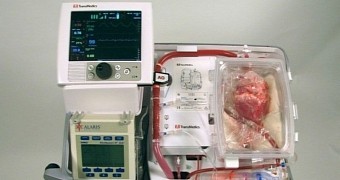This Friday, surgeons in Australia announced that, over the course of the past few months, they had performed three innovative procedures, all of which boiled down to resuscitating dead hearts and transplanting them into patients.
The interventions were carried out at the St. Vincent's Hospital in Sydney and are argued to be the first procedures of this kind to have ever been successfully performed anywhere in the world.
It is understood that, of the three patients who have until now been subjected to such an intervention, the last one was operated on this past Wednesday and is already showing signs of recovery.
The other two, a 57-year-old grandmother named Michelle Gribilas and a 44-year-old father of three identified as Jan Damen, have both made a full recovery and have been released from hospital, Mashable informs.
Transplanting dead hearts into living patients
Information shared with the public by medical experts with the Victor Chang Cardiac Research Institute says that the three people who have until now been transplanted resuscitated hearts all received organs that had stopped beating some 20 minutes before the intervention.
Before being transplanted into the patients' bodies, the resuscitated hearts were all injected with a preservation solution that took 12 years to develop and that served to make the organs more resilient to transplantation.
“In a world first, doctors at St Vincent’s Hospital have managed to transplant a heart that had stopped beating. The donor heart wasn’t beating for up to 20 minutes before it was resuscitated and successfully transplanted,” reads a statement issued by the Victor Chang Cardiac Research Institute.
Furthermore, “The heart was brought back to life, then placed on a machine, before it was injected with a ground breaking preservation solution – developed by the Victor Chang Cardiac Research Institute and St. Vincent’s Hospital.”
What this breakthrough means to ordinary folks
The surgeons who performed these procedures and the specialists working closely with them expect that such interventions will soon be carried out at several other medical facilities across the world and that this practice of transplanting resuscitated hearts into patients will help save 30% more lives.
This is because heart sufferers will no longer have to sit around and wait to be offered the organ of a brain-dead person whose heart is still beating. Thus, having a wider pool of organs available for transplant will surely up heart sufferers' survival chances.
“The new technique now allows doctors to transplant hearts that have stopped beating. This represents a paradigm shift in organ donation and will result in a major increase in the pool of hearts available for transplantation,” the folks behind the Victor Chang Cardiac Research Institute say.

 14 DAY TRIAL //
14 DAY TRIAL //